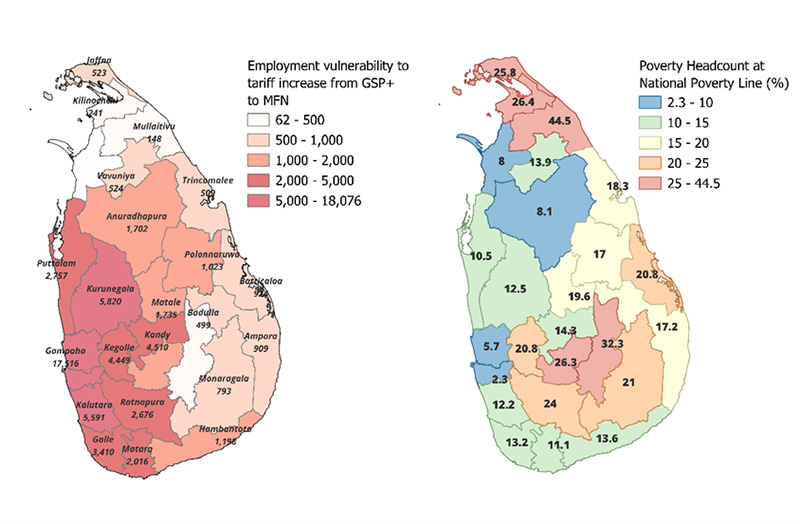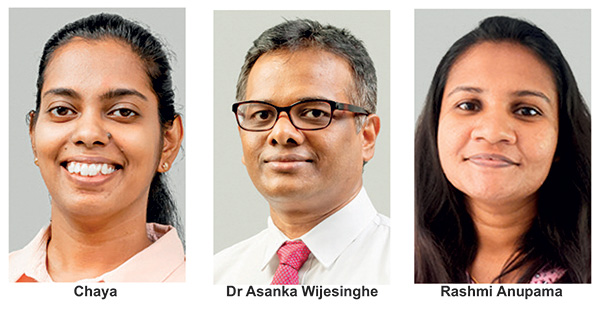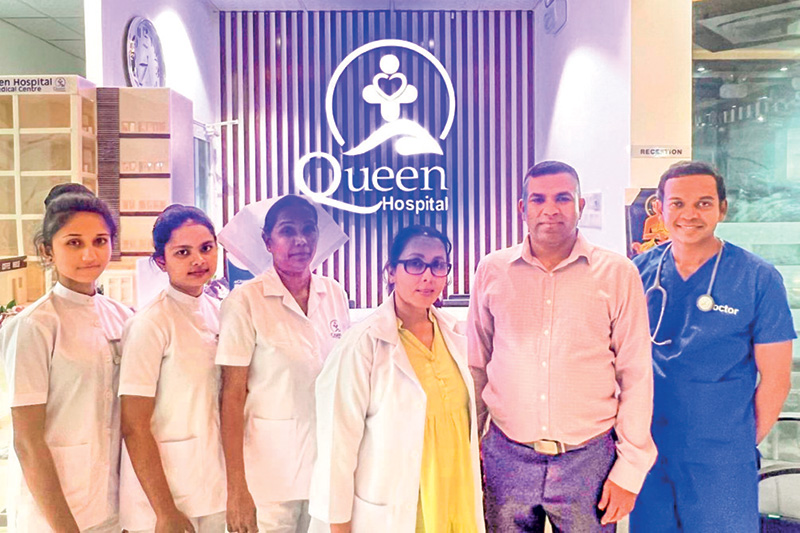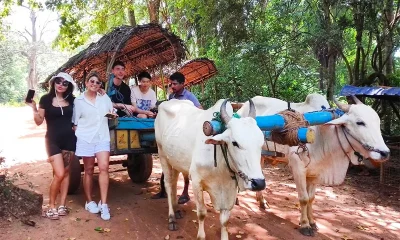Business
GSP+: Can it drive inclusive growth in Sri Lanka?

By Rashmi Anupama, Chaya Dissanayake, and Dr Asanka Wijesinghe
In a mid-October 2024 meeting with the European Union (EU) Ambassador, Sri Lanka reaffirmed its commitment to strengthening trade relations with the EU, particularly highlighting the role of the GSP+ programme in boosting Sri Lankan exports. This discussion underscores the significance of the GSP+, which offers tariff preferences for Sri Lanka’s exports to the EU. The GSP+ offers reduced tariffs on exports, conditional upon the recipient countries implementing 27 international conventions. These conventions include standards on labour and human rights, environmental sustainability, and good governance. Sri Lanka’s major exports to the EU, such as wearing apparel, employ low and medium-skilled, and female workers, as well as estate and rural sector workers, directing benefits of GSP+ to vulnerable communities.
GSP+: A Lifeline for Sri Lanka’s Economy
In 2023, Sri Lanka exported goods worth USD 3.63 billion (Bn) to the EU and the United Kingdom (UK) representing 30% of total exports of Sri Lanka. The 1,301 products exported by Sri Lanka under the six-digit Harmonized System (HS) codes, concentrate on key sectors such as wearing apparel, rubber, seafood, and tea. Notably, the EU and the UK are major export destinations for wearing apparel accounting for over half (54.9%) of Sri Lanka’s total wearing apparel exports.
GSP+ preference offers Sri Lanka zero tariffs on many goods, granting relative price competitiveness in the EU market. Without GSP+, tariffs would revert to the EU’s Most Favoured Nation (MFN) rates. The preference margin – the difference between MFN and GSP+ – is more than 10 percentage points for high-value export sectors like wearing apparel.
However, GSP+ benefits are not fully utilised. Complex rules of origin make compliance challenging and costly, particularly for the wearing apparel sector. For instance, in 2019, Sri Lanka exported USD 1.31 Bn of knitted or crocheted apparel to the EU and UK, with only about half the exports (52.3%) benefiting from GSP+. Similarly, 52.3% of non-knitted apparel exports, valued at USD 842.45 million (Mn), used GSP+, while rubber products had a 96.4% utilisation rate, contributing USD 340.95 Mn in exports.
Consequently, the effect of a potential tariff increase will differ across export sectors, depending on factors like export volume, utilisation rates, and the size of the tariff hike. The forthcoming publication “Who Stands to Lose? Examining the Fallout of GSP+ Preference Erosion in Sri Lanka”, shows that once all these factors are accounted for, reverting to MFN tariffs due to the loss of GSP+ could lead to a decline in exports of USD 1.23 Bn, or 36.7%, compared to 2019, after accounting for utilisation rates.
The wearing apparel sector is expected to experience the largest hit, with a projected loss of USD 996.38 Mn, representing a 44.63% drop in exports. Although the utilisation rate for GSP+ in the wearing apparel sector is relatively low at 52.3%, the large volume of exports and the 10-percentage point difference between MFN and GSP+ rates mean that the sector would suffer significant losses. Key products such as men’s underpants, brassieres, and shirts, which are among Sri Lanka’s top 10 exports to the EU, are vulnerable to the negative effects of GSP+ withdrawal.

The Impact on Jobs and Inclusive Economic Growth
Sectors highly vulnerable to export changes play a crucial role in promoting inclusive economic growth in Sri Lanka, as they provide significant employment opportunities for women and rural workers. As a result, any potential decline in exports would disproportionately affect these vulnerable groups within the labour force, intensifying the economic challenges they face.
The IPS analysis suggests that the loss of GSP+ could put 73,574 workers at risk of losing their jobs. The apparel sector employs 87.1% of these vulnerable workers. The apparel industry currently employs 475,741 workers, of whom 70.5% are women.
When the embedded employment in the export losses is broken down by gender and skill level, it becomes clear that women, along with low and medium-skilled workers, will be the hardest hit. Out of the 73,574 workers at risk, 42,958 are women in low or medium-skilled roles. In the wearing apparel sector, 61.4% of vulnerable employees are females employed in low and medium-skilled occupations. Overall, 82% of all vulnerable workers are low and medium-skilled, highlighting the disproportionate impact on these workers if GSP+ is withdrawn.
The Road Ahead: Strategies for Inclusive Growth
Sri Lanka cannot afford to lose GSP+ given the current economic situation and the growth stage of the country. The slowly growing employment numbers show that alternative sectors are not in existence to absorb the labour force vulnerable to the GSP+ loss. Finding alternative jobs in the formal sector will be even more difficult.
To avoid this scenario, it is in Sri Lanka’s best interest to comply with the agreed-upon conventions and retain the GSP+ status. In the future, as the country reaches higher income levels, the GSP+ loss may be more manageable. However, at this stage, GSP+ is a driving force for increasing Sri Lanka’s exports and overall income.
While maintaining the crucial GSP+ preference, Sri Lanka should attempt to increase its utilisation by expanding the cumulation of non-originating materials, similar to the recent EU approval of cumulation between Sri Lanka and Indonesia. Enhanced cumulation will especially benefit the country’s wearing apparel sector. The Trade Preference Outlook-2024 of the UNCTAD also underscores the importance of reforming rules of origin, accounting for supply chain realities. In the longer term, Sri Lanka can look into options like entering a free trade agreement with the EU to cope with the adverse effects of GSP+ loss at a higher income stage of the country. This is particularly important as Sri Lanka’s eligibility for GSP+ is not only tied to compliance with the required conventions but also to its income classification. If Sri Lanka transitions to upper-middle-income status, it will no longer qualify for the GSP+. This highlights the need for long-term solutions to maintain preferential market access.
Dr Asanka Wijesinghe is a Research Fellow at IPS with research interests in macroeconomic policy, international trade, labour and health economics. He holds a BSc in Agricultural Technology and Management from the University of Peradeniya, an MS in Agribusiness and Applied Economics from North Dakota State University, and an MS and PhD in Agricultural, Environmental and Development Economics from The Ohio State University.
Chaya Dissanayake is a Research Officer at the Institute of Policy Studies of Sri Lanka (IPS). She holds a B.Sc. (Hons) in Agriculture specialised in Agricultural Economics from the University of Jaffna and is currently reading for an MSc in Integrated Water Resource Management at the Postgraduate Institute of Agriculture, Peradeniya. Her research interests include agricultural policies and institutions, disaster risk management, poverty and inequality, SMEs, women and the workforce.
Rashmi Anupama is a Research Assistant at the Institute of Policy Studies of Sri Lanka (IPS). She holds a BSc in Agriculture, specialised in Agricultural Economics, with a First Class from the Faculty of Agriculture, Rajarata University of Sri Lanka. Her research interests include international trade, regional integration, macroeconomic policy, structural reforms, and entrepreneurship.
Business
ComBank tops banking sector in LMD’s first Corporate Happiness Index

The Commercial Bank of Ceylon has been ranked No 1 among Sri Lankan banks in the inaugural Corporate Happiness Index (CHI) just released by LMD magazine.The Bank has also been ranked one of Sri Lanka’s “happiest second homes” taking fifth place overall in the ranking, following the high positions it achieved in the 16 attributes that made up the survey conducted by PepperCube Consultants for this pioneering initiative.
Remarkably, Commercial Bank was the highest-ranked bank in 14 of the 16 attributes, leading the banking sector in several fundamentally-important aspects related to employees, such as ‘Remuneration scales,’ ‘Rewards & Perks,’ ‘Career progression,’ ‘Work environment,’ ‘Gender balance,’ ‘Health & wellbeing,’ ‘Work-life balance,’ ‘Workplace diversity,’ and ‘Workplace flexibility.’
Commercial Bank was also ranked No 1 in the banking sector for ‘Financial stability,’ ‘Corporate leadership,’ ‘Workplace camaraderie,’ ‘Open culture’ and ‘Recreational facilities.’
Besides its emphatic leadership in the banking sector, the LMD Corporate Happiness Index ranked Commercial Bank among the top five corporate entities in Sri Lanka across all sectors, in 10 of the 16 attribute rankings, and among the top ten overall, in 15 of the attribute rankings.
The Bank was ranked second overall for the attributes of ‘Financial stability’ and ‘Workplace camaraderie,’ third for ‘Career progression’ and fourth in Sri Lanka for ‘Workplace diversity’as well as ‘Workplace flexibility.’
“The importance of workplace happiness cannot be over-emphasised in today’s fast-paced corporate environments, and we welcome this groundbreaking effort by LMD magazine to redefine understanding of workplace wellbeing and to rank companies on their progress in this sphere,” Commercial Bank Managing Director/CEO Sanath Manatunge said. “At Commercial Bank, a lot of attention is devoted to creating a workplace culture that ensures that employees can achieve their full potential as they build their careers. Our biggest strength is our people, and there is intense focus on their wellbeing, including minimising work-related stress which can negatively affect the health of employees as well as the productivity of the organisation.”
Commercial Bank also has the distinction of being in the Top 10 of the LMD 100 ranking of Sri Lanka’s leading listed companies, which is primarily based on turnover, every year since the ranking was first published 31 years ago.
Business
Ceylinco Life closes 2024 with 13 awards for financial reporting and brand excellence

Sri Lanka’s life insurance market leader Ceylinco Life has brought 2024 to a close on a victorious note, winning a total of 13 awards, 11 for distinction in financial reporting and two for brand excellence.
The company’s annual report for 2023 received accolades from four prestigious local and international bodies – CMA Sri Lanka, CA Sri Lanka, the South Asian Federation of Accountants (SAFA) and MerComm Inc., the presenter of the prized ARC Awards.
Titled ‘The Core of Trust,’ Ceylinco Life’s integrated annual report for 2023 was recognised as one of the ‘Top 10 Excellent Integrated Reports’ in Sri Lanka at the CMA Excellence in Integrated Reporting Awards 2024, and was adjudged the first runner-up in the Insurance category. CMA Sri Lanka is the national professional management accounting body.
The Annual Report also won the Silver award in the Insurance sector, the Bronze for Corporate Governance Disclosure, and three Certificates of Recognition for Sustainability Reporting, Integrated Reporting and Digitally Transformative Reporting respectively, at the 2024 edition of the CA Sri Lanka Annual Report Awards, now branded the ‘TAGS’ Awards.
Business
Queen’s Hospital Medical Centre Opens in Ratmalana, Offering Affordable and Advanced Healthcare

The newly opened Queen’s Hospital Medical Centre in Ratmalana is revolutionizing private healthcare with state-of-the-art facilities and compassionate services. Equipped with advanced medical technologies, including ultrasound, echo, and X-ray machines, the hospital ensures accurate and timely diagnoses for patients. A team of experienced medical officers, nurses, and healthcare professionals is dedicated to providing exceptional care, said a release.
Patients can access OPD treatments for just Rs. 550, and until 31 January 2025, enjoy a 50% discount on X-rays and hospital charges for ultrasound or echo tests. On 29 January, the hospital will host a special medical camp offering free screenings for cholesterol, diabetes, and heart conditions. Pre-registration is required to secure a spot.
Queen’s Hospital also introduces a daycare service for elderly parents, allowing families to attend to their commitments while ensuring their loved ones are cared for in a safe, professional environment. Serving Ratmalana and surrounding areas like Kalutara, Dehiwala-Mount Lavinia, Moratuwa, and Maharagama, the hospital eliminates the need to travel to Colombo for quality care. Convenient e-channeling services enable patients to choose their preferred doctor and save time and money.
-

 Features6 days ago
Features6 days agoThe recovery has begun
-

 Business7 days ago
Business7 days agoSri Lanka budget deficit decreased by Rs. 487 bn in first 10 months of 2024
-

 News7 days ago
News7 days agoSita Ratwatte passes away
-

 Business7 days ago
Business7 days agoDigital marketing in high gear to increase tourist arrivals to Sri Lanka
-

 Editorial7 days ago
Editorial7 days agoFlashbacks to war
-

 Features5 days ago
Features5 days agoAKD faces challenging year ahead
-

 Editorial6 days ago
Editorial6 days agoBashing bureaucrats
-

 Editorial5 days ago
Editorial5 days agoA kiri-kekiri issue











